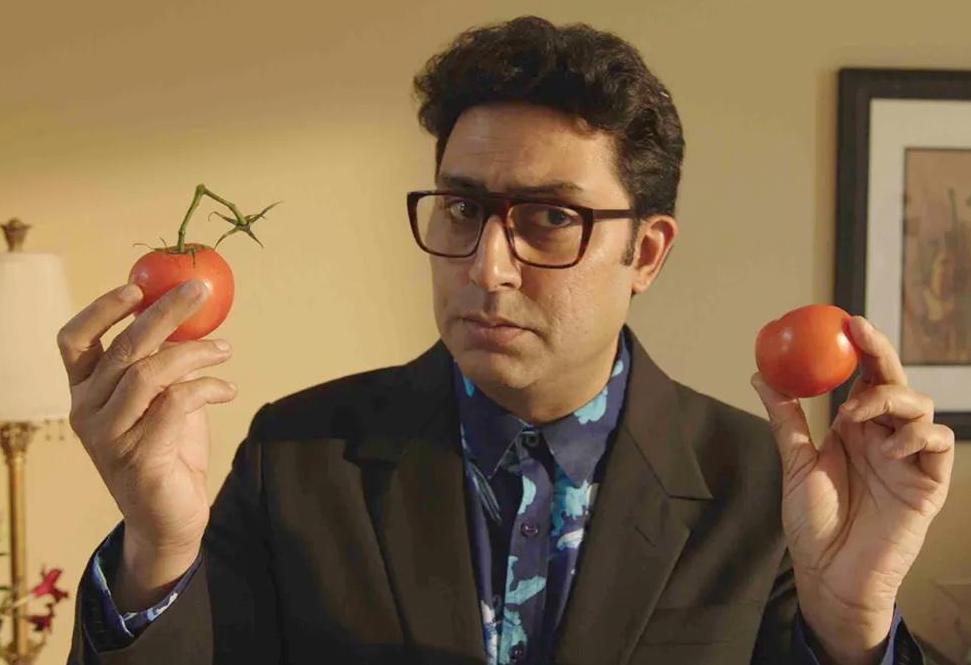Shoojit Sircar’s I Want to Talk is a tale of resilience and determination based on real-life cancer survivor Arjun Sen’s memoir, Raising a Father. To its credit, the film shows the Hindi film industry that a biopic doesn’t have to be a hagiography celebrating only the protagonist’s struggles and glorified choices. It can also be an understated tale of the human spirit that dignifies the choice to forge one’s path amid adversity.
Arjun Sen (Abhushek Bachchan) is a marketing executive of Indian origin based in the USA. His approach to his profession is pragmatic and devoid of any emotions. Due to his unwavering dedication to his job, his personal life begins to suffer leading to his marriage falling apart. His young daughter, Reya (Pearle Dey), begins staying with each of her parents on alternate days of the week. Things take a turn when Arjun is diagnosed with laryngeal cancer, which soon spreads to his other organs. He loses his house in alimony and is forced to rent a small apartment for himself. His relationship with Reya worsens even as his health continues to decline. Yet, Arjun remains determined to fight the disease and strives to rebuild his relationship with the now-in-her-teens Reya (Ahilya Bamroo)…
For the bulk of I Want to Talk, Shoojit Sircar works with a structure that helps us deeply connect with Arjun’s undying spirit as we watch him navigate one difficult surgery after another. Though fettered by his struggles to survive, his journey reflects resilience, vulnerability, and a search for hope in the face of hardship. In many ways, such attributes make the film feel like a natural extension of the themes Sircar explored in Piku and October, those dealing with family, selfless love, and clinging to the last vestiges of hope. With this film especially, his protagonist and his predicaments transcend being mere conduits for the issues that interest him. Arjun emerges as a fully realized individual, whose indomitable will to live becomes the life force at its most insistent, lashing out against fate with stubborn resolve.
Sircar ensures the film maintains a seamless flow. After a scene has served its purpose, we move to the next. The film has enough material to become a melodramatic, saccharine-coated story, but the treatment prevents it from becoming so. Even the comic situations are handled with such nuance that they genuinely tickle our funny ones without being overt. All of this makes the film anything but passive viewing; it demands the audience’s active engagement, and if we are patient enough to follow the journey, the payoff is satisfyingly fulfilling.
The screenplay by Ritesh Shah avoids traditional narrative structures and prefers flowing unpredictably through linear episodes. There are no dramatic high points, only a steady flow of subtle shifts that shape this tale of endurance. In the process, we realise that the beauty of life is revealed in the lack of excess. This melding of restraint with poetic storytelling highlights the tiny, day-to-day victories and the truest forms of love shown by those closest to us. There is so much power in this film as it dares us to not fear death and, without being didactic, reminds us to take life as it is. Arjun’s life becomes a source of inspiration and is a celebration of the power and unquestionable need for communication, the strength of willpower, and the human resolve to overcome sorrow and misery.
Abhishek Bachchan brings a level of naturalism to his role that we haven’t seen in his performances until now. His body language speaks volumes about what he won’t say: that he’s undaunted, impatient, and hates letting others decide his fate. The prosthetics, scars on his body, and his bald head exude a raw emotional depth to his act. Pearle Dey as the younger and Ahilya Bamroo as the teenage Reya, respectively, both offer a sensitive portrayal of the inner conflicts of a character grappling with the failed marriage of her parents and coping with her father’s deteriorating condition. Kristin Goddard as Nurse Nancy portrays a character who diligently takes care of her patient with ease and sincerity. Jayant Kriplani as Dr Deb is a straightforward doctor who doesn’t hesitate to display a cold, professional demeanor while genuinely caring for the well-being of his patients.
Avik Mukherjee’s cinematography is painterly and lyrical. The framing does everything in its power to make the claustrophobia inherent in the story palpable. The images serve as silent witnesses to the fate of the characters. The editing by Shekhar Prajapati maintains a subtle and flowing rhythm, complementing the theme of the film and carrying the narrative forward smoothly. Dipankar Chaki’s sound design is restrained, balanced, and seamlessly enmeshed into the fabric of the film. Mansi Dhruv Mehta’s production design is minimalist and admirably complements the varying moods of the film.
I Want To Talk may ultimately be a little too languid and subdued but there is catharsis to be found in its quiet moments and finely tuned performances. It is undeniably a little gem that emerges as a sharp contrast to the flashy, big-budget spectacles of the last few weeks and is undoubtedly one of the best films of the year.
Hindi, English, Drama, Color


